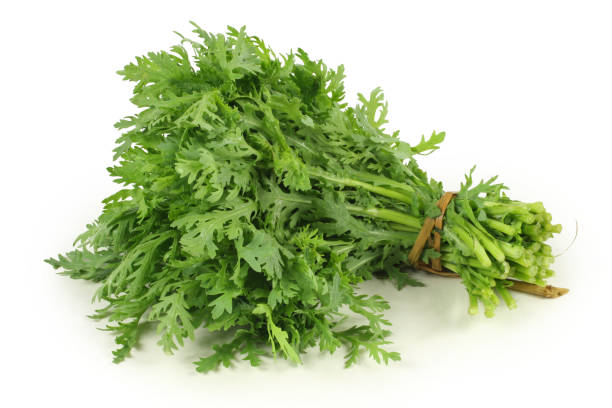

Glebionis coronaria (L.) Cass. ex Spach
|
It is commonly known as Guldaudi and belongs to the Asteraceae family. β-carotene, α-pinene, β-pinene, Linoleic acid are among some of the bioactive compounds found in this plant. The leaves are either eaten fresh in a salad or as cooked greens. C. coronarium extract improved Type-1 immune response which remarkably induced the production of Type-1 cytokines including IFN-γ and IL-12 by natural killer (NK) cells and dendritic cell (DC) respectively via TLR-signaling cascades of (DC). The stimulation with the extract of C. coronarium caused DC maturation involving with up-regulations of surface expression levels of MHC class I, MHC class II, CD40, and CD86 as well as induction of IL-12 production. Mode of Consumption : Fresh in a salad or cooked |
| Plant Details | Agro-climatic Zone | Vernacular Names | Pictures |
| Scientific Name: Glebionis coronaria (L.) Cass. ex Spach Family: Asteraceae Bercht. & J.Presl Class: Magnoliopsida Order: Asterales Genus: Glebionis Cass. Fruiting Season: November to March Parts: Leaves & Tender shoots |
|
Andhra Pradesh : Chamanti Assam : Baborisak Bihar : Guldaudi Delhi : Guldaudi Haryana : Guldaudi Jharkhand : Guldaudi Karnataka : Shevanti Madhya Pradesh : Guldaudi Maharashtra : Gulesvati, Tursiphal, Seoti Punjab : Bagaur, Zaenil Rajasthan : Guldaudi Tamil Nadu : Shaman-tippu Telangana : Chamanti Uttar Pradesh : Guldaudi Uttarakhand : Guldaudi West Bengal : Guldaudi |
 Leafy bundle |
| Compound/Extract | Activity | Mode of Action | Marker/References |
| Plant extract | Immunoboosting | Glebionis coronaria (Chrysanthemum coronarium) improved Type-1 immune response which remarkably induced the production of Type-1 cytokines including IFN-γ and IL-12 by natural killer (NK) cells and dendritic cell (DC) respectively via TLR-signaling cascades of (DC). The stimulation with the extract of C. coronarium caused DC maturation with up-regulations of surface expression levels of MHC class I, MHC class II, CD40, and CD86 as well as induction of IL-12 production. | IFN-γ and IL-12[3] |
| Essential oil | Anticancer | Experiments of Glebionis coronaria (Chrysanthemum coronarium) essential oil against four human cancer cell lines like human breast adenocarcinoma (MCF-7), the human ductal breast epithelial tumor (T47D) , the human colon adenocarcinoma (Caco-2), and the human epithelial carcinoma (HeLa) cell lines show anti -proliferative activity by growth inhibition of various tumor cell lines with LD50 values ranging from 43 to 110 𝜇g/mL. | [4] |
| Plant extract | Anti-inflammatory | Glebionis coronaria (Chrysanthemum coronarium) extract decreased TNF-α synthesis in LPS activated monocyte, and decreased cytokine in vitro. | TNF-α[5] |
| Major Class | Metabolites (Content of bioactives: mg/100g Fresh Weight) |
| Carboxylic acid ester | Lyratyl acetate : [2] |
| Carotenoid | β- Carotene: [1] |
| Terepene | Camphor: [2] |
| Terpene | α-Pinene: , β-Pinene: [2] |
| Vitamin | Vitamin B1: , Vitamin B2: , Vitamin C: [1] |
| Effect | Observation | DOI |
| Disease | Formulation | Reference | Author | TKDL |
| Information from Wealth of India | Reference |
|
CSIR(1950).The Wealth of India, Raw materials,Vol.-II ,P.148, New Delhi, India |
| 4.2, 4.2.1, 4.2.1.1, 4.2.1.3, 4.2.2.8, 4.2, 4.2.1, 4.2.1.1, 4.2.1.3, 4.2.2.8 |
| CSIR-North East Institute of Science and Technology, Jorhat-6, Assam, India
CSIR-Institute of Himalayan Bioresource Technology, Palampur-61,Himachal Pradesh, India |